FYU015-0: Investigating the Effects of Social Media on Mental Health
VerifiedAdded on 2022/12/26
|5
|1589
|2
Project
AI Summary
This assignment investigates the multifaceted relationship between social media usage and mental health, particularly focusing on the impact on teenagers and young adults. The research draws on a variety of sources, including BBC News, The Prince Trust, and academic journals, to highlight both the positive and negative effects. It examines how heavy social media use can lead to decreased self-esteem, increased anxiety and depression, and the potential for cyberbullying. The assignment also explores the role of social media in fostering online communities and providing emotional support, while acknowledging the potential for addiction and the displacement of face-to-face interactions. References include studies by Igor Pantic, Fazida Karim, and others, as well as articles from US News and The Indian Express, providing a comprehensive overview of this critical issue. The assignment also includes a Harvard-style reference list with a minimum of 5 newspaper articles, 2 journal articles, and 2 books, with a brief presentation script explaining the choices made.
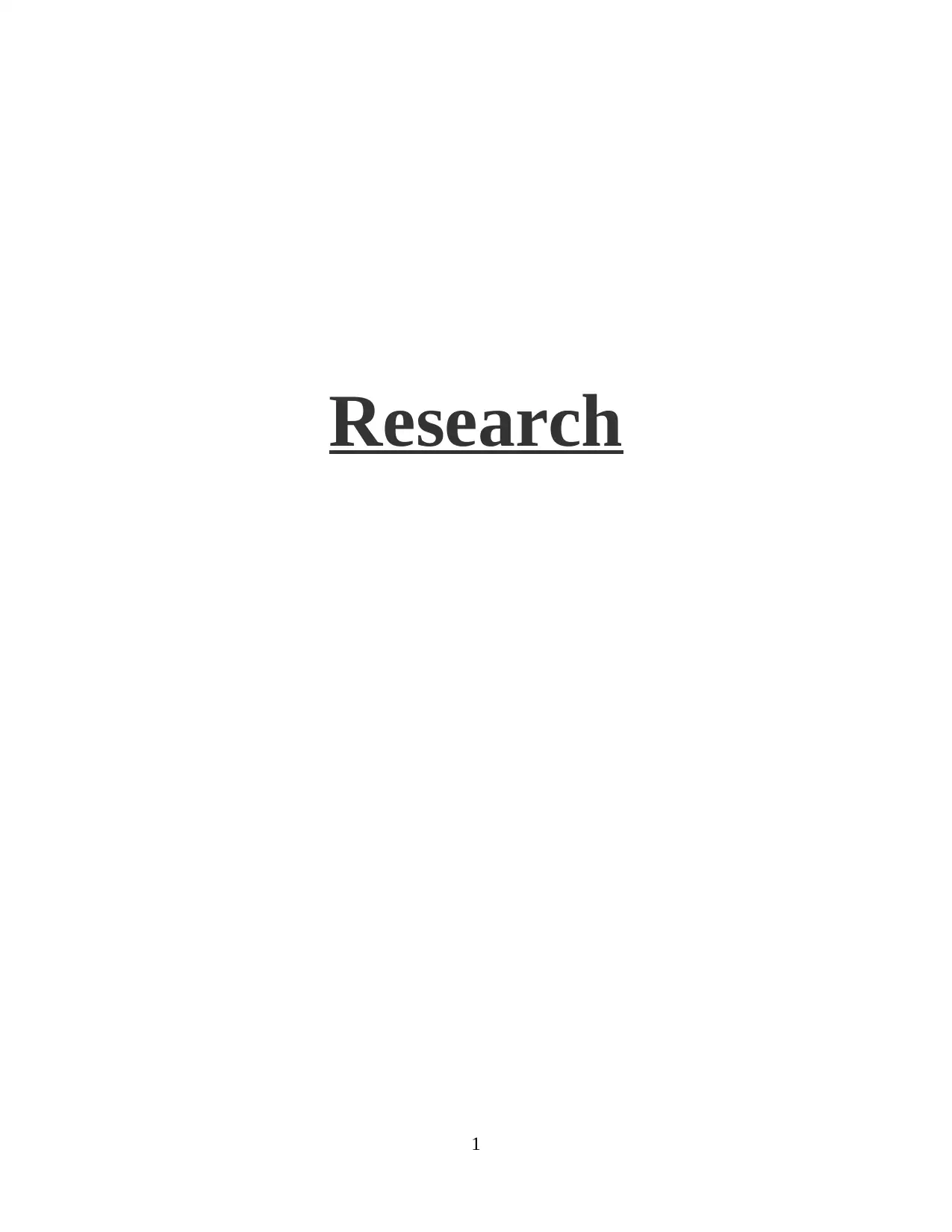
Research
1
1
Paraphrase This Document
Need a fresh take? Get an instant paraphrase of this document with our AI Paraphraser
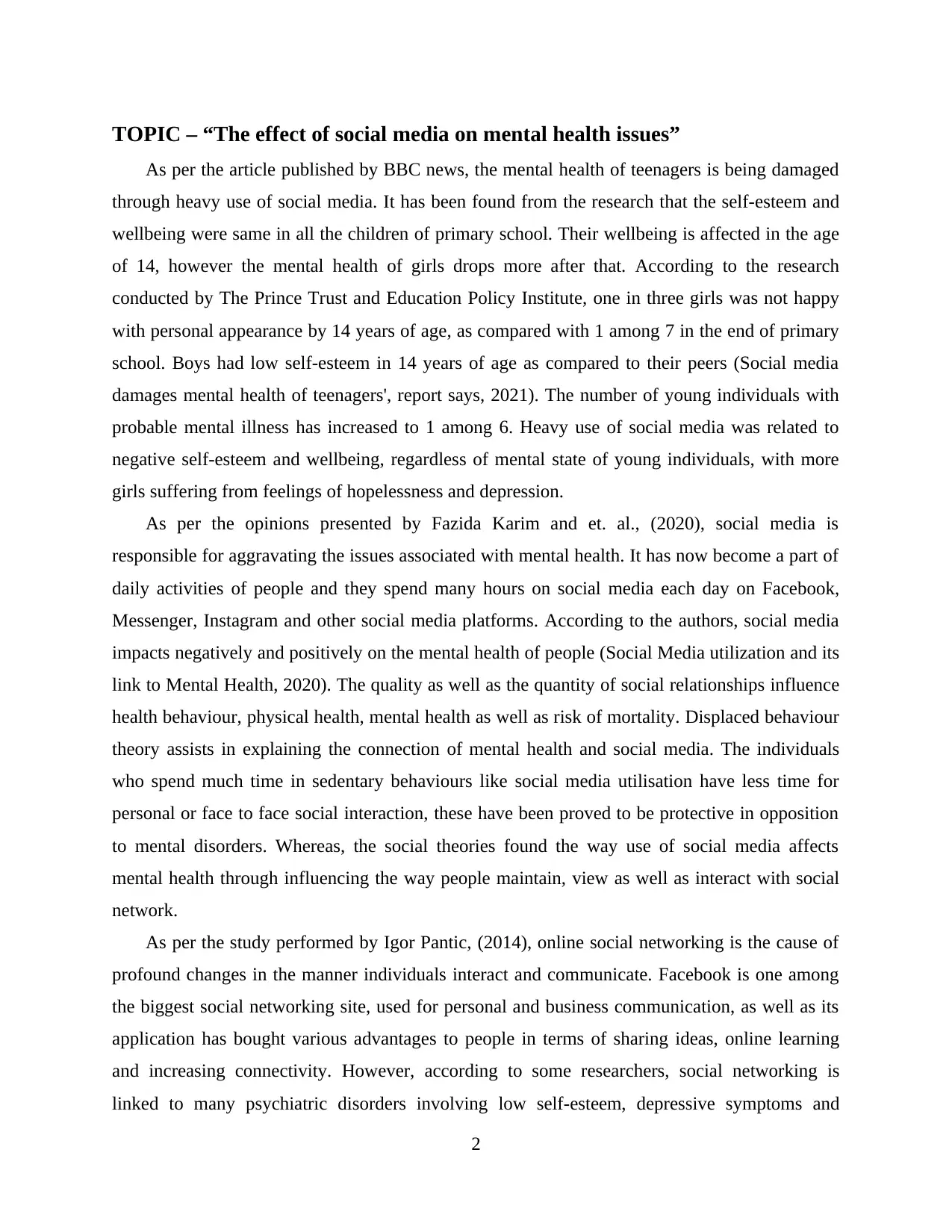
TOPIC – “The effect of social media on mental health issues”
As per the article published by BBC news, the mental health of teenagers is being damaged
through heavy use of social media. It has been found from the research that the self-esteem and
wellbeing were same in all the children of primary school. Their wellbeing is affected in the age
of 14, however the mental health of girls drops more after that. According to the research
conducted by The Prince Trust and Education Policy Institute, one in three girls was not happy
with personal appearance by 14 years of age, as compared with 1 among 7 in the end of primary
school. Boys had low self-esteem in 14 years of age as compared to their peers (Social media
damages mental health of teenagers', report says, 2021). The number of young individuals with
probable mental illness has increased to 1 among 6. Heavy use of social media was related to
negative self-esteem and wellbeing, regardless of mental state of young individuals, with more
girls suffering from feelings of hopelessness and depression.
As per the opinions presented by Fazida Karim and et. al., (2020), social media is
responsible for aggravating the issues associated with mental health. It has now become a part of
daily activities of people and they spend many hours on social media each day on Facebook,
Messenger, Instagram and other social media platforms. According to the authors, social media
impacts negatively and positively on the mental health of people (Social Media utilization and its
link to Mental Health, 2020). The quality as well as the quantity of social relationships influence
health behaviour, physical health, mental health as well as risk of mortality. Displaced behaviour
theory assists in explaining the connection of mental health and social media. The individuals
who spend much time in sedentary behaviours like social media utilisation have less time for
personal or face to face social interaction, these have been proved to be protective in opposition
to mental disorders. Whereas, the social theories found the way use of social media affects
mental health through influencing the way people maintain, view as well as interact with social
network.
As per the study performed by Igor Pantic, (2014), online social networking is the cause of
profound changes in the manner individuals interact and communicate. Facebook is one among
the biggest social networking site, used for personal and business communication, as well as its
application has bought various advantages to people in terms of sharing ideas, online learning
and increasing connectivity. However, according to some researchers, social networking is
linked to many psychiatric disorders involving low self-esteem, depressive symptoms and
2
As per the article published by BBC news, the mental health of teenagers is being damaged
through heavy use of social media. It has been found from the research that the self-esteem and
wellbeing were same in all the children of primary school. Their wellbeing is affected in the age
of 14, however the mental health of girls drops more after that. According to the research
conducted by The Prince Trust and Education Policy Institute, one in three girls was not happy
with personal appearance by 14 years of age, as compared with 1 among 7 in the end of primary
school. Boys had low self-esteem in 14 years of age as compared to their peers (Social media
damages mental health of teenagers', report says, 2021). The number of young individuals with
probable mental illness has increased to 1 among 6. Heavy use of social media was related to
negative self-esteem and wellbeing, regardless of mental state of young individuals, with more
girls suffering from feelings of hopelessness and depression.
As per the opinions presented by Fazida Karim and et. al., (2020), social media is
responsible for aggravating the issues associated with mental health. It has now become a part of
daily activities of people and they spend many hours on social media each day on Facebook,
Messenger, Instagram and other social media platforms. According to the authors, social media
impacts negatively and positively on the mental health of people (Social Media utilization and its
link to Mental Health, 2020). The quality as well as the quantity of social relationships influence
health behaviour, physical health, mental health as well as risk of mortality. Displaced behaviour
theory assists in explaining the connection of mental health and social media. The individuals
who spend much time in sedentary behaviours like social media utilisation have less time for
personal or face to face social interaction, these have been proved to be protective in opposition
to mental disorders. Whereas, the social theories found the way use of social media affects
mental health through influencing the way people maintain, view as well as interact with social
network.
As per the study performed by Igor Pantic, (2014), online social networking is the cause of
profound changes in the manner individuals interact and communicate. Facebook is one among
the biggest social networking site, used for personal and business communication, as well as its
application has bought various advantages to people in terms of sharing ideas, online learning
and increasing connectivity. However, according to some researchers, social networking is
linked to many psychiatric disorders involving low self-esteem, depressive symptoms and
2
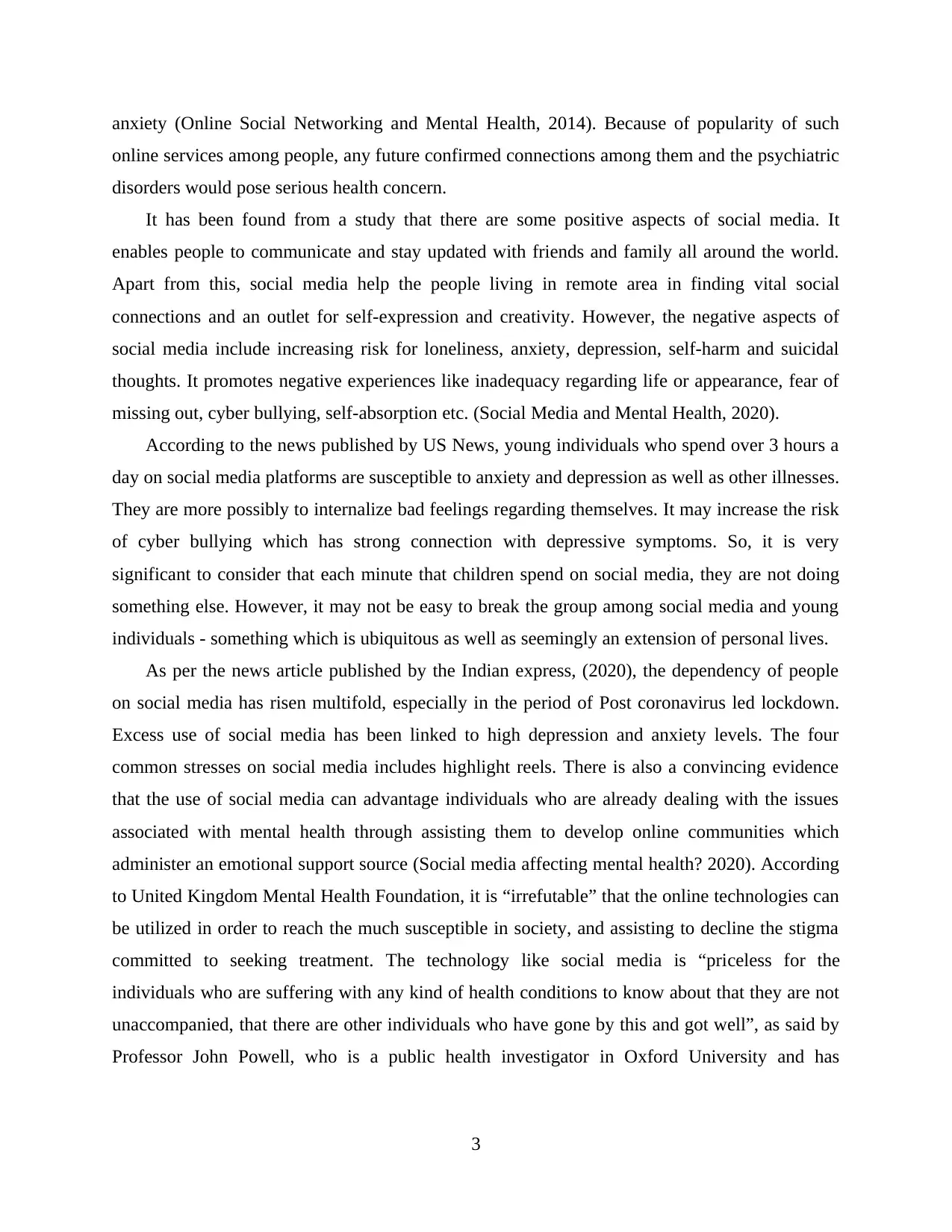
anxiety (Online Social Networking and Mental Health, 2014). Because of popularity of such
online services among people, any future confirmed connections among them and the psychiatric
disorders would pose serious health concern.
It has been found from a study that there are some positive aspects of social media. It
enables people to communicate and stay updated with friends and family all around the world.
Apart from this, social media help the people living in remote area in finding vital social
connections and an outlet for self-expression and creativity. However, the negative aspects of
social media include increasing risk for loneliness, anxiety, depression, self-harm and suicidal
thoughts. It promotes negative experiences like inadequacy regarding life or appearance, fear of
missing out, cyber bullying, self-absorption etc. (Social Media and Mental Health, 2020).
According to the news published by US News, young individuals who spend over 3 hours a
day on social media platforms are susceptible to anxiety and depression as well as other illnesses.
They are more possibly to internalize bad feelings regarding themselves. It may increase the risk
of cyber bullying which has strong connection with depressive symptoms. So, it is very
significant to consider that each minute that children spend on social media, they are not doing
something else. However, it may not be easy to break the group among social media and young
individuals - something which is ubiquitous as well as seemingly an extension of personal lives.
As per the news article published by the Indian express, (2020), the dependency of people
on social media has risen multifold, especially in the period of Post coronavirus led lockdown.
Excess use of social media has been linked to high depression and anxiety levels. The four
common stresses on social media includes highlight reels. There is also a convincing evidence
that the use of social media can advantage individuals who are already dealing with the issues
associated with mental health through assisting them to develop online communities which
administer an emotional support source (Social media affecting mental health? 2020). According
to United Kingdom Mental Health Foundation, it is “irrefutable” that the online technologies can
be utilized in order to reach the much susceptible in society, and assisting to decline the stigma
committed to seeking treatment. The technology like social media is “priceless for the
individuals who are suffering with any kind of health conditions to know about that they are not
unaccompanied, that there are other individuals who have gone by this and got well”, as said by
Professor John Powell, who is a public health investigator in Oxford University and has
3
online services among people, any future confirmed connections among them and the psychiatric
disorders would pose serious health concern.
It has been found from a study that there are some positive aspects of social media. It
enables people to communicate and stay updated with friends and family all around the world.
Apart from this, social media help the people living in remote area in finding vital social
connections and an outlet for self-expression and creativity. However, the negative aspects of
social media include increasing risk for loneliness, anxiety, depression, self-harm and suicidal
thoughts. It promotes negative experiences like inadequacy regarding life or appearance, fear of
missing out, cyber bullying, self-absorption etc. (Social Media and Mental Health, 2020).
According to the news published by US News, young individuals who spend over 3 hours a
day on social media platforms are susceptible to anxiety and depression as well as other illnesses.
They are more possibly to internalize bad feelings regarding themselves. It may increase the risk
of cyber bullying which has strong connection with depressive symptoms. So, it is very
significant to consider that each minute that children spend on social media, they are not doing
something else. However, it may not be easy to break the group among social media and young
individuals - something which is ubiquitous as well as seemingly an extension of personal lives.
As per the news article published by the Indian express, (2020), the dependency of people
on social media has risen multifold, especially in the period of Post coronavirus led lockdown.
Excess use of social media has been linked to high depression and anxiety levels. The four
common stresses on social media includes highlight reels. There is also a convincing evidence
that the use of social media can advantage individuals who are already dealing with the issues
associated with mental health through assisting them to develop online communities which
administer an emotional support source (Social media affecting mental health? 2020). According
to United Kingdom Mental Health Foundation, it is “irrefutable” that the online technologies can
be utilized in order to reach the much susceptible in society, and assisting to decline the stigma
committed to seeking treatment. The technology like social media is “priceless for the
individuals who are suffering with any kind of health conditions to know about that they are not
unaccompanied, that there are other individuals who have gone by this and got well”, as said by
Professor John Powell, who is a public health investigator in Oxford University and has
3
⊘ This is a preview!⊘
Do you want full access?
Subscribe today to unlock all pages.

Trusted by 1+ million students worldwide
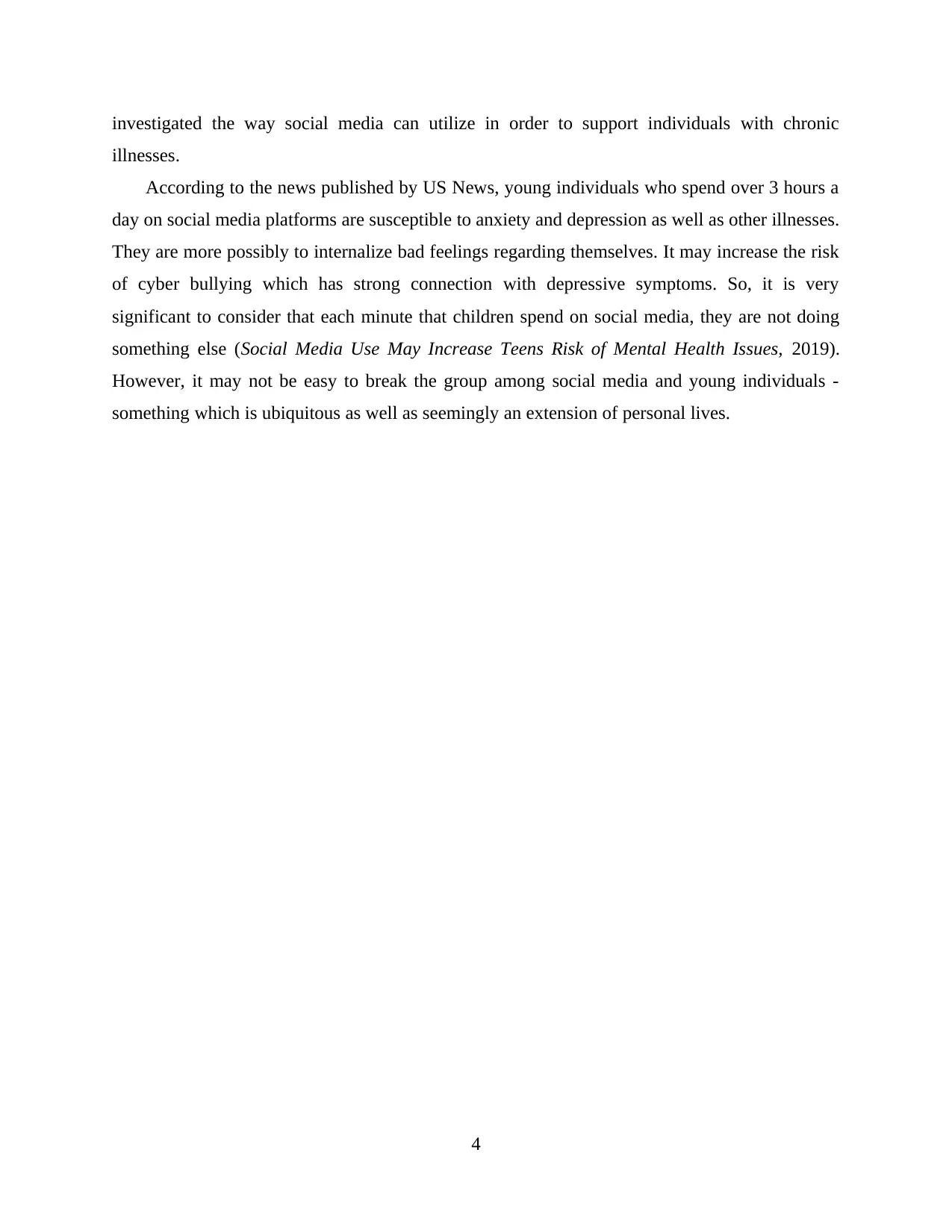
investigated the way social media can utilize in order to support individuals with chronic
illnesses.
According to the news published by US News, young individuals who spend over 3 hours a
day on social media platforms are susceptible to anxiety and depression as well as other illnesses.
They are more possibly to internalize bad feelings regarding themselves. It may increase the risk
of cyber bullying which has strong connection with depressive symptoms. So, it is very
significant to consider that each minute that children spend on social media, they are not doing
something else (Social Media Use May Increase Teens Risk of Mental Health Issues, 2019).
However, it may not be easy to break the group among social media and young individuals -
something which is ubiquitous as well as seemingly an extension of personal lives.
4
illnesses.
According to the news published by US News, young individuals who spend over 3 hours a
day on social media platforms are susceptible to anxiety and depression as well as other illnesses.
They are more possibly to internalize bad feelings regarding themselves. It may increase the risk
of cyber bullying which has strong connection with depressive symptoms. So, it is very
significant to consider that each minute that children spend on social media, they are not doing
something else (Social Media Use May Increase Teens Risk of Mental Health Issues, 2019).
However, it may not be easy to break the group among social media and young individuals -
something which is ubiquitous as well as seemingly an extension of personal lives.
4
Paraphrase This Document
Need a fresh take? Get an instant paraphrase of this document with our AI Paraphraser
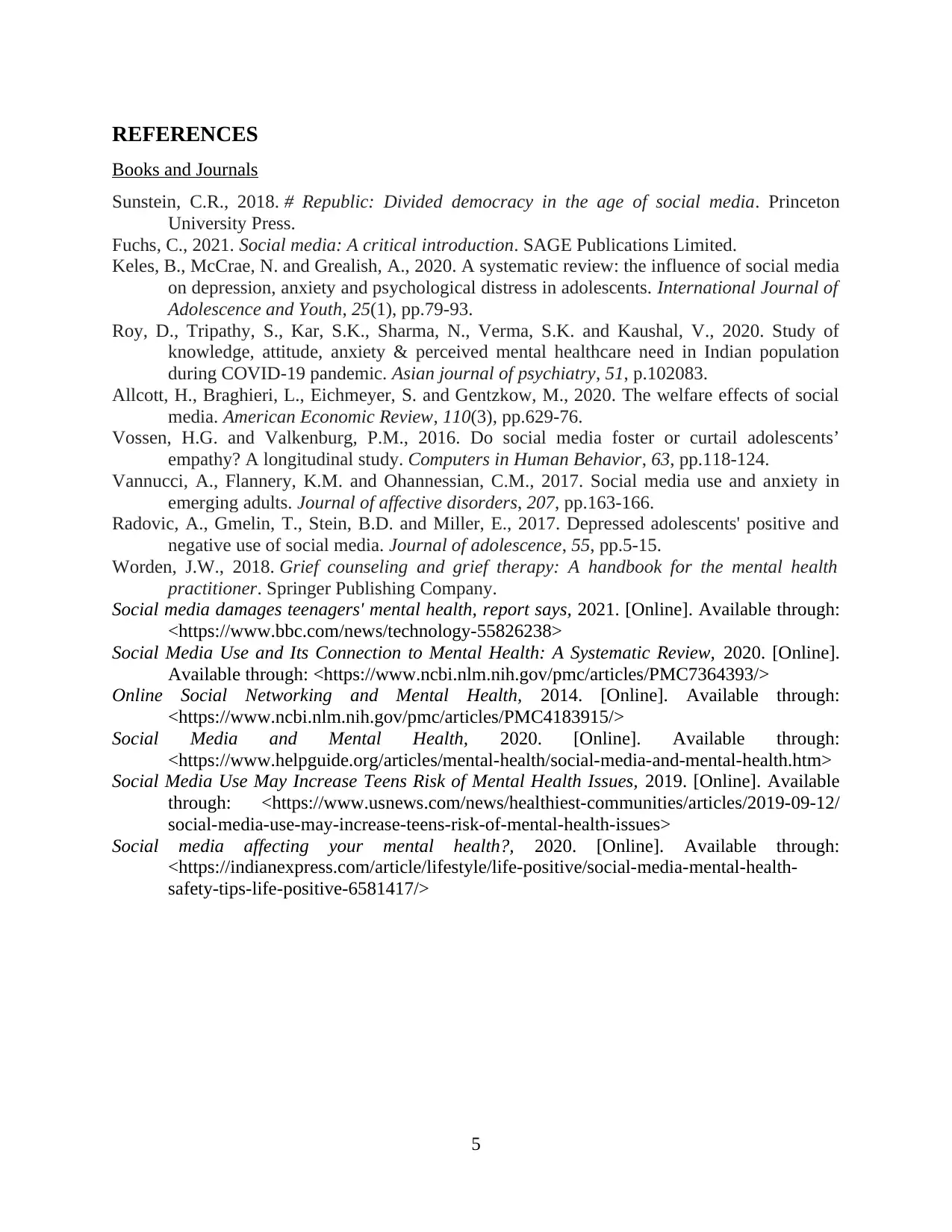
REFERENCES
Books and Journals
Sunstein, C.R., 2018. # Republic: Divided democracy in the age of social media. Princeton
University Press.
Fuchs, C., 2021. Social media: A critical introduction. SAGE Publications Limited.
Keles, B., McCrae, N. and Grealish, A., 2020. A systematic review: the influence of social media
on depression, anxiety and psychological distress in adolescents. International Journal of
Adolescence and Youth, 25(1), pp.79-93.
Roy, D., Tripathy, S., Kar, S.K., Sharma, N., Verma, S.K. and Kaushal, V., 2020. Study of
knowledge, attitude, anxiety & perceived mental healthcare need in Indian population
during COVID-19 pandemic. Asian journal of psychiatry, 51, p.102083.
Allcott, H., Braghieri, L., Eichmeyer, S. and Gentzkow, M., 2020. The welfare effects of social
media. American Economic Review, 110(3), pp.629-76.
Vossen, H.G. and Valkenburg, P.M., 2016. Do social media foster or curtail adolescents’
empathy? A longitudinal study. Computers in Human Behavior, 63, pp.118-124.
Vannucci, A., Flannery, K.M. and Ohannessian, C.M., 2017. Social media use and anxiety in
emerging adults. Journal of affective disorders, 207, pp.163-166.
Radovic, A., Gmelin, T., Stein, B.D. and Miller, E., 2017. Depressed adolescents' positive and
negative use of social media. Journal of adolescence, 55, pp.5-15.
Worden, J.W., 2018. Grief counseling and grief therapy: A handbook for the mental health
practitioner. Springer Publishing Company.
Social media damages teenagers' mental health, report says, 2021. [Online]. Available through:
<https://www.bbc.com/news/technology-55826238>
Social Media Use and Its Connection to Mental Health: A Systematic Review, 2020. [Online].
Available through: <https://www.ncbi.nlm.nih.gov/pmc/articles/PMC7364393/>
Online Social Networking and Mental Health, 2014. [Online]. Available through:
<https://www.ncbi.nlm.nih.gov/pmc/articles/PMC4183915/>
Social Media and Mental Health, 2020. [Online]. Available through:
<https://www.helpguide.org/articles/mental-health/social-media-and-mental-health.htm>
Social Media Use May Increase Teens Risk of Mental Health Issues, 2019. [Online]. Available
through: <https://www.usnews.com/news/healthiest-communities/articles/2019-09-12/
social-media-use-may-increase-teens-risk-of-mental-health-issues>
Social media affecting your mental health?, 2020. [Online]. Available through:
<https://indianexpress.com/article/lifestyle/life-positive/social-media-mental-health-
safety-tips-life-positive-6581417/>
5
Books and Journals
Sunstein, C.R., 2018. # Republic: Divided democracy in the age of social media. Princeton
University Press.
Fuchs, C., 2021. Social media: A critical introduction. SAGE Publications Limited.
Keles, B., McCrae, N. and Grealish, A., 2020. A systematic review: the influence of social media
on depression, anxiety and psychological distress in adolescents. International Journal of
Adolescence and Youth, 25(1), pp.79-93.
Roy, D., Tripathy, S., Kar, S.K., Sharma, N., Verma, S.K. and Kaushal, V., 2020. Study of
knowledge, attitude, anxiety & perceived mental healthcare need in Indian population
during COVID-19 pandemic. Asian journal of psychiatry, 51, p.102083.
Allcott, H., Braghieri, L., Eichmeyer, S. and Gentzkow, M., 2020. The welfare effects of social
media. American Economic Review, 110(3), pp.629-76.
Vossen, H.G. and Valkenburg, P.M., 2016. Do social media foster or curtail adolescents’
empathy? A longitudinal study. Computers in Human Behavior, 63, pp.118-124.
Vannucci, A., Flannery, K.M. and Ohannessian, C.M., 2017. Social media use and anxiety in
emerging adults. Journal of affective disorders, 207, pp.163-166.
Radovic, A., Gmelin, T., Stein, B.D. and Miller, E., 2017. Depressed adolescents' positive and
negative use of social media. Journal of adolescence, 55, pp.5-15.
Worden, J.W., 2018. Grief counseling and grief therapy: A handbook for the mental health
practitioner. Springer Publishing Company.
Social media damages teenagers' mental health, report says, 2021. [Online]. Available through:
<https://www.bbc.com/news/technology-55826238>
Social Media Use and Its Connection to Mental Health: A Systematic Review, 2020. [Online].
Available through: <https://www.ncbi.nlm.nih.gov/pmc/articles/PMC7364393/>
Online Social Networking and Mental Health, 2014. [Online]. Available through:
<https://www.ncbi.nlm.nih.gov/pmc/articles/PMC4183915/>
Social Media and Mental Health, 2020. [Online]. Available through:
<https://www.helpguide.org/articles/mental-health/social-media-and-mental-health.htm>
Social Media Use May Increase Teens Risk of Mental Health Issues, 2019. [Online]. Available
through: <https://www.usnews.com/news/healthiest-communities/articles/2019-09-12/
social-media-use-may-increase-teens-risk-of-mental-health-issues>
Social media affecting your mental health?, 2020. [Online]. Available through:
<https://indianexpress.com/article/lifestyle/life-positive/social-media-mental-health-
safety-tips-life-positive-6581417/>
5
1 out of 5
Related Documents
Your All-in-One AI-Powered Toolkit for Academic Success.
+13062052269
info@desklib.com
Available 24*7 on WhatsApp / Email
![[object Object]](/_next/static/media/star-bottom.7253800d.svg)
Unlock your academic potential
Copyright © 2020–2026 A2Z Services. All Rights Reserved. Developed and managed by ZUCOL.




